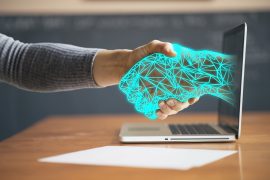Upskilling Workforce with AI-Driven Personalized Learning

Why Should Enterprises Adopt Personalized Learning?
Personalized learning is a learner-centric training approach that tailors curriculum and instruction modules to a participant’s individual needs and interests. Let’s say in an organization, one sales rep is having trouble making effective cold calls and another is unable to land product presentations. These employees are in need of different training types altogether.
Enterprises can leverage AI to create personalized learning strategies based on employees’ interests, strengths, proficiency and readiness levels. AI helps interpret massive amounts of data and analyzes data-driven insights to develop learning pathways bespoke to individuals’ needs. Data-driven insights allow managers to predict course maps, make relevant changes and provide feedback in real time. These training programs can then be implemented through mobile learning, instructor-led sessions, e-learning, hands-on training and more.
Reskilling and Upskilling with Personalized Learning
The rise of digitization and remote work has placed new demands on employees who require different skills to support work and business priorities. Furthermore, millennials make up 35% of the US labor force, currently the largest working generation. By 2025, they will represent 75% of the global workforce. Most organizations still have boomers and Gen-Yers as their backbone, which makes digital literacy and upskilling particularly crucial.
While reskilling and upskilling initiatives play a vital role in career progression, enterprises must first conduct a needs assessment to identify current and future skill gaps and help leaders and employees understand areas of focus and current capabilities. Essentially a “GPS” for employees, these learning pathways identify skills learners need to develop to advance in their careers.
This is where personalized programs come in. In a survey, 77% of L&D professionals thought personalized learning is vital for employee engagement. Tailored programs not only tap into employees’ interests and business needs but also build a culture that encourages life-long learning for everyone from interns to C-suites.
Flexibility is equally important. Employees with tight schedules must be provided on-the go training through bite-sized modules. Micro-learning modules offer five to fifteen minute sessions that help employees stick to goals. Other engaging formats are interactive videos, infographics offering cheat sheets, and quick reference guides for application on the job. Enterprises should provide coaching and mentoring as well.
AI-based upskilling platforms also map content to help companies identify required competencies and provide learners with a personalized plan to close specific skill gaps. Through these platforms, enterprises can encourage AI-human collaboration as AI does the connective work and leaders use the technology to meet the needs of the organization.
The Future of Personalized Learning
With AI at the forefront, personalized learning has many exciting prospects and untapped opportunities. Machine learning will add value to individual learning journeys through personality-based personalization. Taking advantage of psychology, this approach dives deeper than demographic and behavior to offer insights and build experiences based on causation rather than correlation. This tailored mechanism is yet to be fully realized in education but will produce innovations that could shape future learning.
Personalized learning aligns what people want to learn and how they learn to fuel their career goals. By tailoring learning plans and career paths to employee and business needs, enterprises can create a learning culture that unleashes hidden potential and builds a future-ready workforce.
To learn more about our training and skill development programs, visit our education page.


